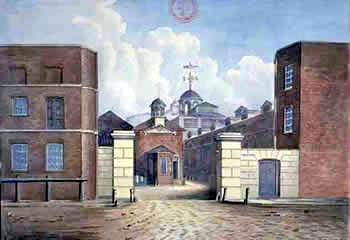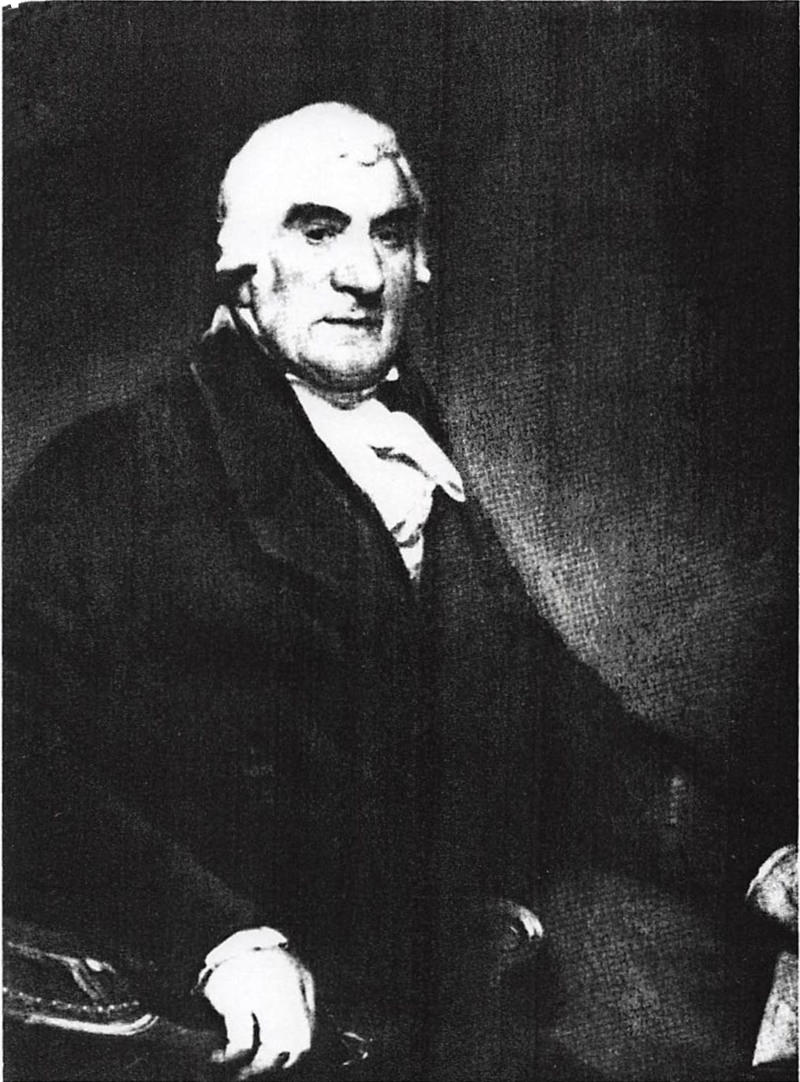Henry Thrale MP : owner 1758-1781
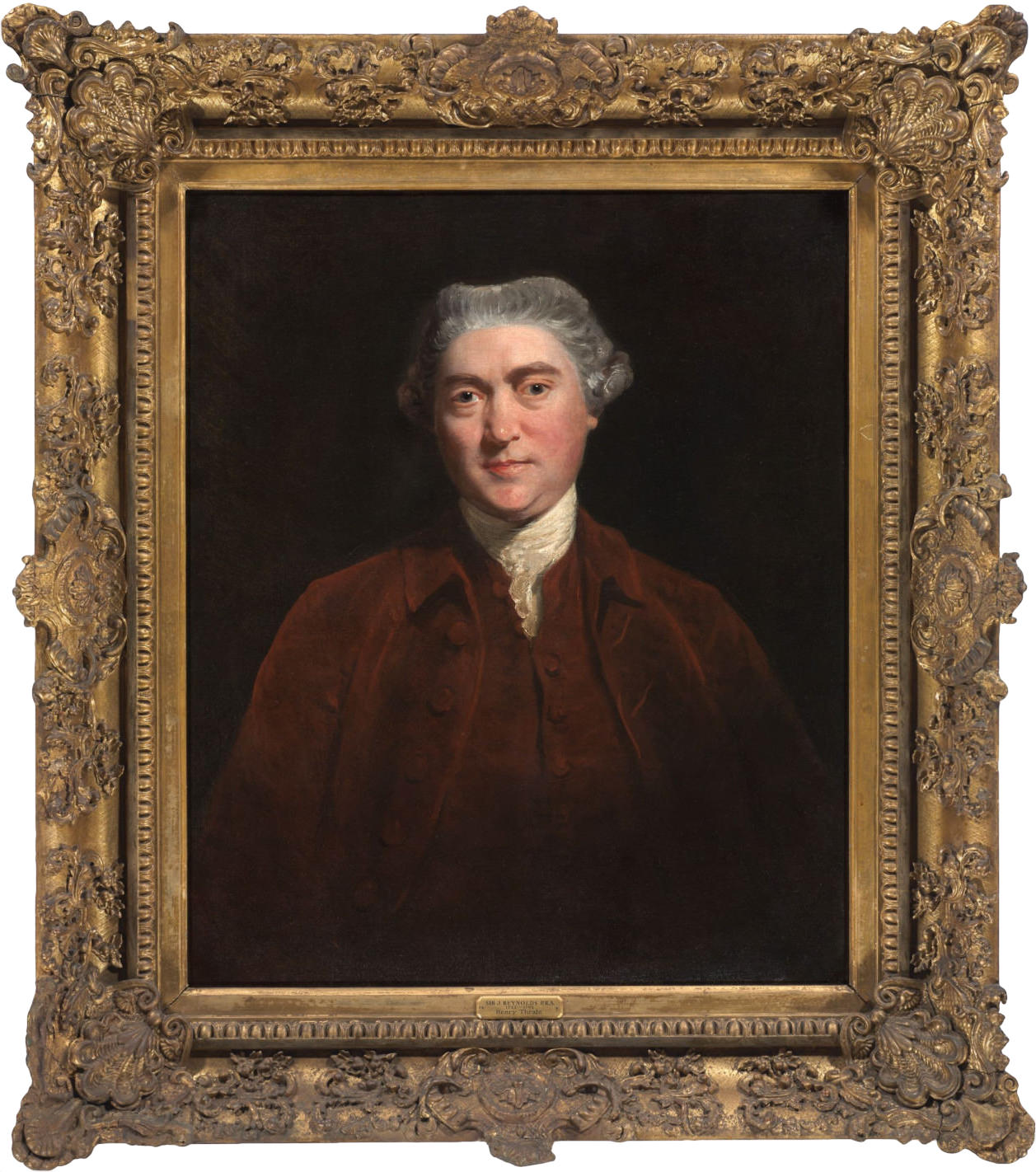 Henry Thrale had been brought into the brewer business by his father in 1748. Ten years later, after his father's death1, Henry Thrale inherited the brewery aged 28. Dr. Johnson, said that Henry Thrale had…
Henry Thrale had been brought into the brewer business by his father in 1748. Ten years later, after his father's death1, Henry Thrale inherited the brewery aged 28. Dr. Johnson, said that Henry Thrale had…
Good sense enough to carry on his father's trade.
The brewery was situated in a 9 acre compound, with the clerks' quarters, store houses, vaults and vats, dung pits and stabling for nearly 100 horses. Here was brewed Thrale's Intire Porter which was well known as delicious…
from the frozen regions of Russia to the burning sands of Bengal and Sumatra.
Thrale's purl (beer) recipe »Henry once said to Samuel Johnson…
I would not quit the brewery for an annuity of ten thousand pounds a year. Not that I get ten thousand a year by it, but it is an estate to a family.
Locality
Upstream towards Blackfriars Bridge2, some decent riverside houses had been built, but virtually everywhere else in the Borough3 there existed nothing more appealing than a jumble of workshops and poor workmen's cottages. The very names of the streets were cheerless. Brewery House in which the Thrales and Samuel Johnson lived during the winter, stood attached to offices at the entrance to the brewery yard. The Thrales lived in Deadmans Place, which led into Dirty Lane on one side and Foul Lane on the other. Deadmans Place, according to tradition, took its name from the number of dead interred there in the Great Plague, soon after the Restoration. It is the second turning on the left in Park Street, going from the Borough Market4. Maid Lane, which joined Deadmans Place at the river end - according to Dodsley5, published three years before Mrs Thrale's arrival - was…
a long straggling place with ditches on either side; the passages to the houses being over little bridges.
The whole area was subject to flooding. Over the road was Clink Street, handy for the Clink Prison, described at the time as…
a very gloomy hole.
The prison was burnt down in the Gordon Riots of 1780, but even now prisons are colloquially known as 'the clink'. Virtually on the brewery premises was a noisy and dusty stonecutter's yard. Behind lay an old burial ground, and behind that, an open sewer. Then there were the tanneries and Messrs Potts's vinegar factory. Mixed in were odd patches of open space locals used as tenter grounds for stretching cloth.
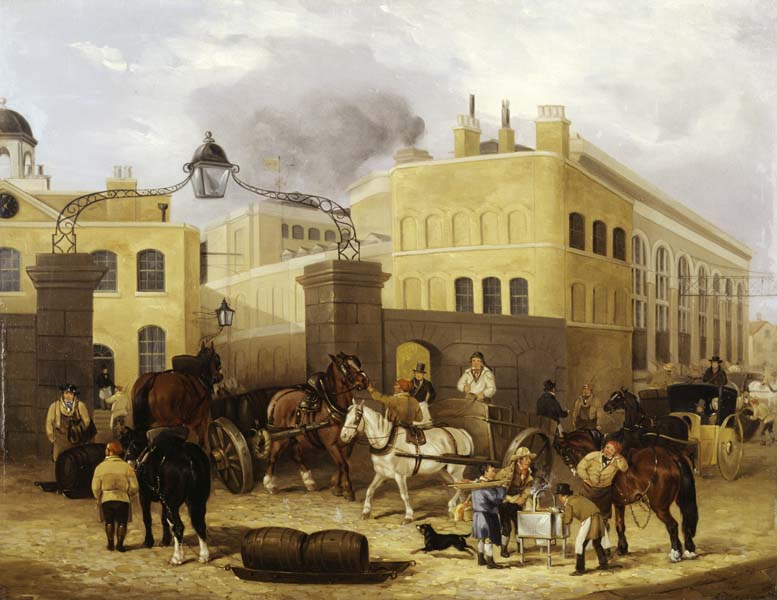
Brewery production
Like his father, Henry expanded the business and in the first year of his ownership alone the value of plant and equipment rose from £3,569 to £7,110 as a result of upgrading to more modern production increasing equipment. Henry was a pioneer in using a hydrometer and was the first major brewer to use it, in contrast to Whitbread, who Henry was determined to out brew. The brewery was also well known for it famous Thrale's Russian Stout and by 1760 Thrale had by become one of the top ten porter brewers in London. By 1760 Thrale's brewery was producing 30,000 barrels a year. In 1764, Henry purchase more land, including The Castle inn. In 1772 Henry Thrale almost went bankrupt by the expense of a scheme for brewing beer without malt or hops. They were in debt to the tune of £130,0006. Hester Thrale raised money from her mother and other friends and cleared the debt in nine years. From this point on she took an active role in managing the brewery and again after Henry's stroke in 1779.
Hester Thrale was not averse to using her golden tongue in the day-to-day business. She wrote to the brewery manager John Perkins in 1773…
Cardess of the Blue Posts has turned refractory and applied to Huck's people who have sent him in beer. I called on him today however and by dint of unwearied solicitation - for I kept him at the coach-side for a full half hour - I got his order for six butts more.
The Globe site became covered in buildings and in 1777 it was purchased by Henry Thrale to expand the brewery. On 1 March 1779 Hester Thrale wrote of the brewhouse in Thraliana…
The Government, for the second year, have taxed the brewery so as to curtail our particular income not less than two Thousand Pounds Sterling a Year.—dreadful Times!
Shortly after Henry Thrale's first stroke7, Hester wrote…
In the midst of publick & private Distress, here is my mad Master going to build at the boro' House again:—new Store Cellars, Casks, & God knows what. I have however exerted my self & driv'n off his Workmen with a high Hand.—Is this a Time as Elijah say'd for oliveyards, & Vineyards? & Men Servants & Maid Servants? when our Trade & our profits are both decreasing daily? & the Nation itself stagnating with Imbecillity? I never saw any thing so absurd—surely his head is still confused; nothing but frenzy this Time excuse Expence to the amount of ten or twelve Thousand Pounds sure. "
In June 1779, she wrote in Thraliana…
I examined our own Collections at the Brewhouse this Morning, & found the Difference between last Year and this Year in the Weekly Collections for one Month only—this present Month of July—to be irnmense—no less than seven hundred & forty five Pounds short of the Collections for the same Weeks in June & July last Year 1778. I will draw the Account out over Leaf as I receive it from the Clerk, but I wrote the Sum down in Letters to shew that no manual Mistake could have been made.
| A:D 1778.Town Trade only. | A:D 1779.Town Trade only. | ||
|---|---|---|---|
| £————— | £————— | ||
| Four Weeks collection | 6340 : 12 : 4. | Four Weeks Collection | 5595 : 6 : 8. |
| Additional Houses gain'd 14 | 350 : 0 : 0 | ||
| ————— | |||
| 6690 :12 : 4 | |||
| 5595 : 6 : 8 | |||
| ————— | |||
| 1095 : 5 : 6 |
Now here is a real defalcation of £745 : 5s: 6d—to which the Clerk judiciously added the Collection from the fourteen new houses gained into the Trade; for if things had stood as they did last Year, that Money would have been added ys Year, to the Receipts made the last Year; whereas now—tho' these houses have been gained into the Trade, the Trade is still Loser seven hundred & forty five Pounds, which with the Money collected from the new houses beside—amounts to no less than one Thousand & ninety five Pounds Loss, and that in the Space of a Month, four Weeks Collection only. This is a curious, tho' melancholy Speculation, we will push it a little farther; In this great Town we have six Capital Brew- houses; now suppose the Collections of each fall short as ours does [as no doubt they do; for our House is rather eminently prosperous; & besides some body must have Lost the Houses we have gained too], one Thousand Pounds pr Month: here is six Thousand Pounds worth of Beer less, sold in London ev'ry Month this Year than the last, I say in London, for I have not calculated the enormous Difference between either the Exportation or Country Trade; I believe the falling off in both those, but particularly the first, is more than could be dreamed of.—
On 21 January 1780 she wrote in Thraliana…
We shall brew but Sixty Thousand Barrels of Beer this Year! pretty Times indeed; and Mr Smelt saying he wishes we had more Taxes, & the King more power: I wish the King would put an End to this destructive War I'm sure; the Year before last we brew'd 96,000 Barrels—last Year only 76,000, & this Winter we shall scarece turn 60,000. So horribly is the Consumption lessened by the War.
### Theft
In February 1781, Hester wrote in Thraliana an account of how the Abroad-Clerk, Mr. Lancaster, stole £2,000 from the brewery…
After so much Inconstancy—as Boswell said8 when he was going to be married; we are at last settled in a ready furnished House Grosvenor Square for the three following Months—and mean like Seged9 in the Rambler to be happy; the first Felicity however that I was saluted with on my Arrival, was an Account of Lancaster our favourite Abroad-Clerk10 running away with two Thousand Pounds: so I have been running after him I think into all the hiding Places of this filthy Town, & lost him at last. I am so afraid the Wretch will cut his own Throat, or do some desperate Act of Remorse—for he really was an honest Man once, & I feel Concern for him in the midst of the plagues he has been pleased to accumulate upon me. if he would have negotiated with me I would have protected the Creature from Thrale's & Perkins's Vengeance, but he would run away; so farewell Lancaster & 2000£— Mr Thrale does not mind it of a Pin, but then he is not in the humour to mind Expence of any sort; his Spirits are preternaturally high, and portend no Good I am sure; but Sir Richard11 will watch him & prevent a fit, the Apoplexy is now I verily think connected with Dropsy, & the mode of Danger is changed.—
[1]: grosvenor_square
Samuel Johnson
 After 1765, Samuel Johnson came on the scene. His delight in London, coupled with his taste for paradox, did lead him to assert that Pepper Alley, a nearby lane leading down to the Thames, was as healthy a spot as Salisbury Plain and a much happier one. At the same time Johnson's feet were never far off the ground. When the local clergyman preached on friendship, he declared him a blockhead for choosing a subject so ill-fitted to such a busy place, where…
After 1765, Samuel Johnson came on the scene. His delight in London, coupled with his taste for paradox, did lead him to assert that Pepper Alley, a nearby lane leading down to the Thames, was as healthy a spot as Salisbury Plain and a much happier one. At the same time Johnson's feet were never far off the ground. When the local clergyman preached on friendship, he declared him a blockhead for choosing a subject so ill-fitted to such a busy place, where…
the men are thinking on their money, I suppose, and the women are thinking of their mops.
For friends and acquaintances, the brewery was a difficult place to visit. Cabmen could not find the way and boatmen one did not wish to. James Boswell one afternoon failed to persuade the boatmen at Hungerford Stairs - by Charing Cross - to go further than to ferry him over to the bank of the Thames immediately opposite, leaving him to walk the rest of the way. After all, there were few return fares to be picked up in Southwark. Later that night at 1 a.m., Boswell counted himself lucky to secure a hackney coach for the return journey. Society at Brewery House then, Hester Thrale found very circumscribed, particularly in her early years there. It was some consolation that she had two carriages at her disposal, and she took to paying extended daily visits to her mother in Dean Street, Soho. 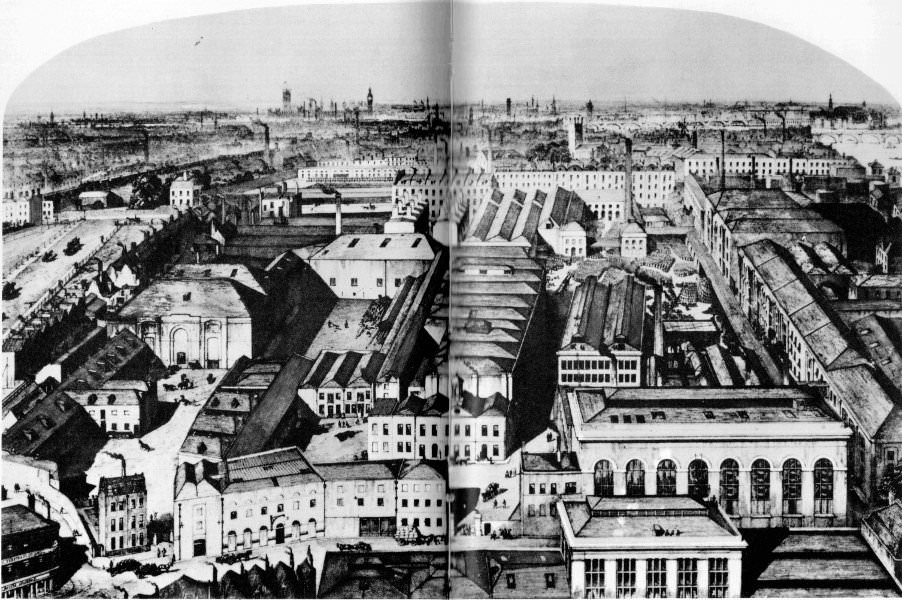
Johnson argued that Hester must come to terms with Southwark. To linger in the country, "feeding the chickens till she starved her understanding", would do her no good and in particular it would sour her relations with her husband. In November 1779 Johnson wrote to Hester that…
I do not see with so much indignation Mr Thrale's desire of being the first Brewer, as your despicable dread of living in the borough … it is the business of the one to brew in a manner most advantageous to his Family, and of the other to live where the general interest may best be superintended.
Four days later, he added…
You must take physick, or be sick; you must live in the Borough, or live still worse.
In Thraliana, Hester lamented…
the Borough Winter which of all other things I most abhor’, but determined that she must go to the Southwark house '& hack at the Trade myself. I hate it heartily, yea heartily! but if living in Newgate would be right I hope I should be content to live in Newgate.
[4]: borough_or_brewery_house_1833
In another entry, she added…
My duty shall make it Pall Mall to me.

More than thirty years after Hester Thrale had departed from grim, run-down Southwark she wrote to her friend Sir James Fellowes…
The best years of my temporal existence — I don’t mean the happiest; but the best for powers of improvement, observation etc. — were passed in what is now Park Street, Southwark, but then Deadmans Place
Hester Thrale later compared the life of the wife of a country gentleman with that of a wealthy businessman…
There is no doubt but that the wife of a trader who flatters himself that he has three or four thousand pounds o' year, lives in much more splendour than the wife of a gentleman who has three or four thousand pounds o' year estate: for the commercial man gains by his business a familiarity with money, tho' totally unmingled with contempt of it, which the aristocrat cannot possibly obtain — who sees his cash so seldom, & finds it so necessary to his happiness. Meantime my country baronet or squire has what he thinks he has, & his wife knows how much and how little that amounts to — as well as himself: but the merchant's lady never is informed of her husband's circumstances any more than his whore is; she cannot be let in to the mysteries of a large & complicated business — probably she could not understand it if she was inform'd, more probably she would talk of it among her female companions, and most probably the acct. of it would interest her so little, she would drive away to the auction hoping wholly to forget it.
### Gordon Riots
The brewery had almost been burned to the ground a few months before Thrale's death12. The Gordon Riots, which broke out on 2 June 1780 and lasted until 9 June, were a fanatical Protestant protest, led by Lord George Gordon, against the modification of the Catholic disability law, which Parliament had consented to in 1779. On 10 June 1780 following the appearance of a notice in a Bath and Bristol paper of that date in which Henry Thrale was falsely asserted to be a papist, the Thrales left Bath. Fanny Burney wrote in her diary…
This villainous falsehood terrified us even for his personal safety, and Mrs. Thrale and I agreed it was best to leave Bath directly, and travel about the country.
We are not here to sell a parcel of boilers and vats, but the potentiality of growing rich beyond the dreams of avarice.
[7]: samuel_johnson
The brewery was attacked on 6 June 1780. According to Perkins obituary notice13, the mob came direct from the release of the Newgate prisoners which was also destroyed in the riots, dragging the chains as spoils. Perkins mildly protested…
it were a shame that men should be degraded by so heavy a load; and he would furnish them with a horse for that purpose:
The bait succeeded. Perkins gave them some porter and food and they departed with loud Hurrahs when the troops arrived. On 20 June 1780 Hester Thrale wrote this account of the riots in Thraliana…
I got back to Bath again, and staid there till the Riots drove us all away the first Week in June:we made a dawdling Journey cross the Country to Brighton where all was likely to be at peace: the Letters we found there however, shewed us how near we were to Ruin here in the Borough; where nothing but the astonishing Presence of Mind shewed by Perkins in amusing the Mob with Meat & Drink & Huzzaes, till Sir Philip Jennings Clerke could get the Troops & pack up the Counting House Bills Bonds &c: & carry them which he did to Chelsea College for Safety;—could have secured us from actual Undoing, The Villains had broke in, & our Brewhouse would have blazed in ten Minutes; when a property of 150,000£ would have been utterly lost, & its once flourishing possessors quite undone. Let me stop here, to give God Thanks for so very undeserved, so apparent an Interposition of Providence in our favour.
I left Mr Thrale at Brighthelmston, & came to Town again to see what was left to be done: we have now got Arms, & mean to defend ourselves by Force, if further Violence is intended. whenever I come on these mad Errands, Dear Mr Johnson is sure always to live with me, & Sir Philip comes every day at some Hour or another:—Good Creature how kind he is! and how much I ought to love him! God knows I am not in this Case wanting to my Duty. I have presented Perkins by my Master's permission with two hundred Guineas, and a Silver Urn for his Lady, with his own Cypher on it, & this Motto—Mollis responsio, Iram avertit.
[9]: west_street_brighton
In fact Hester's letter of 29 June 1780, to Fanny Burney states…
My master was not displeased that I had given Perkins two-hundred guineas instead of one—a secret I never durst tell before, not even to Johnson, not even to you.
It is the greatest event of my life, I have sold my brew-house to Barclay the rich Quaker for £135,000.
— Hester Thrale 1781.
[10]: hester_thrale_1741_1821
Sale of the brewery
Henry Thrale died on 4 April 1781. Hester Thrale lacked the necessary technical knowledge necessary to run the brewery and was in the hands of the brewery manager John Perkins.
With a Thrale son, she might have allotted Perkins a larger share of the profits - he anyway had to be made a partner - and kept the business in the family. But, as things were, a sale was inevitable. Of the twelve Thrale children, all the boys died, and there were left just four daughters; and, as Dr Johnson said…
What can misses do with a brewhouse?
Had ages and circumstances fitted, the solution might have been to marry one of the daughters to Perkins. But probably not, for his heavy, no nonsense north country features and the ungainly body look altogether too proletarian to be acceptable to society Thrales.
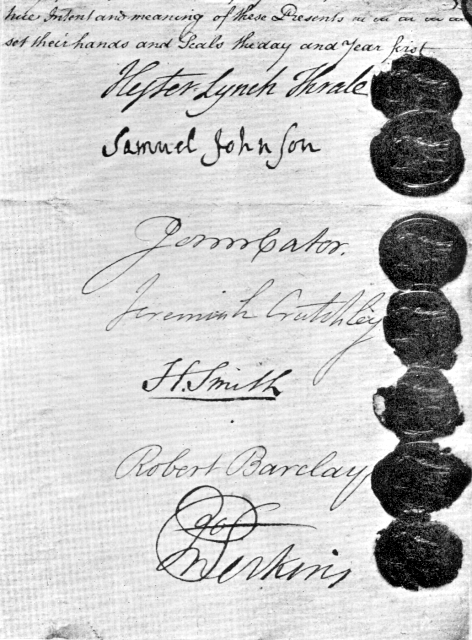
John Perkins married someone else. His second wife, Amelia Bevan, was the widow of an important City Quaker who was also a grandson of the yet more important David Barclay the elder (1682-1769) - still known today for their bank. Through her, Perkins became part of a group of London rich with very different values to the Thrales. The Quakers brought up in a separate educational, cultural and social tradition, introduced an especial dedication and dynamism to business. John Perkins, Scottish-American David Barclay14 Robert barclay and Sylvanus Bevan, united to buy out the Thrale interest in the Anchor Brewery along with The Anchor inn. It was sold by H. Thrale &. Co. on 31 May 1781 for 135,000 pounds sterling15 and started trading as Barclay, Perkins & Company. On 3 June 1781 Hester Thrale wrote in Thraliana…
Well! here have I with the Grace of God, and the Assistance of good Friends, compleated—I really think very happily—the greatest Event of my Life:—I have sold my Brewhouse to Barclay the rich Quaker for 135,000£ to be in four Years Time Pd I have by this Bargain purchased Peace & a stable Fortune; Restoration to my original Rank in Life, and a Situation undisturbed by Commercial Jargon, unpolluted by Commercial Frauds; undisgraced by Commercial Connections: they who succeed me in the House have purchased the Power of being rich beyond the Wish of Rapacity, & I have secured the Improbability of being made Poor by the Flights of the Fairy Speculation.—'Tis thus that a Woman, & Men of feminine Minds, always—I speak popularly—decide upon Life, & chuse certain Mediocrity before probable Superiority; while as Eton Graham says sublimely —Nobler Souls, Tir'd with the tedious and disrelish'd Good, Seek their Employments in acknowledg'd Ill, Danger, and Toil and Pain. on this Principle partly, & partly on worse; was dear Mr Johnson something unwilling—but not much at last—to give up a Trade by which in some Years 15 or 16000£ had undoubtedly been got, but by which in some Years it's Possessor had suffered Agonies of Terror, & totter'd twice upon the Verge of Bankruptcy—Well! if thy own Conscience acquit—who shall condemn thee? not I hope the future Husbands of our Daughters, though I should think it likely enough: however as Johnson says very judiciously, they must either think right or wrong; if they think right, let us now think with them; if wrong,—let us never care what they think! so Adieu to Brewhouse and Borough Wintering, adieu to Trade & Tradesmen's frigid Approbation. May Virtue & Wisdom sanctify our Contract, & make Buyer & Seller happy in the Bargain.16 Mr Perkins saved the Place from the Rioters to enjoy the Dignity of it himself; he has now a fourth Share17, & will perhaps in Time be Master of it all; my Dear Sir Philip18 saved it for me & for my Children; I thanked him for it again today, and earnestly pray to God to bless him for his true, his tender Friendship: I think if ever one human Being loved & respected another that Man from his Heart loves & respects me. I have been, & am now exceedingly ill & Good Lord! how attentive, how kind he is! To him & my sweet Mrs Byron I sent the earliest Intelligence of the ease my Mind had received, they love me with more of their Souls than any body now alive I think. Few people will object to my Management, but Doctor Burney. he had set his heart on my Continuing in Business—I never knew why—but he thought it an exertion of Talents I believe & a proof of Superiority, Seward was urgent with me to quit, & the Attorney General, Wallace came over one Evening on purpose to perswade me. Mrs Montagu has sent me her Approbation in a Letter exceedingly Affectionate & Polite. Tis over now though, & I'll clear my Head of it, & all that belongs to it. I will go to Church, give God Thanks, receive the Sacrament, & forget the Frauds Follies & Inconveniencies of a Commercial Life this day
On 7 July 1781, Hester wrote…
We have had another hot storming Day last Tuesday 3: July about this everlasting Brew house, but 'tis over. Perkins wanted more Indulgence than we as Executors could give him; so I lent him the Money I had saved & put in the Stocks— 2000£ it was, & sold out for 1600£ & odd. He is, or ought to be much obliged; but when a Man has not all he wanted, nothing will make him quite happy19. The whole is now finished, & within three Months too. Tuto, Cito, Jucunde.—
Samuel Johnson - one of the executors of Henry Thrale's will, when challenged about the value of the property by the wary bankers, famously replied…
We are not here to sell a parcel of boilers and vats, but the potentiality of growing rich beyond the dreams of avarice.
- 1. [Ralph Thrale]1 died 9 April 1758.
- 2. Opened in 1769, during the Thrale's time.
- 3. Now know as Southwark
- 4. ELMES, James A TOPOGRAPHICAL DICTIONARY OF LONDON AND ITS ENVIRONS. London Whittaker, Treacher and Arnot 1831.
- 5. London and Its Environs Described.
- 6. £13 million today.
- 7. June 1779.
- 8. In his letter to Hester Thrale on 5 September 1769.
- 9. Rambler no 204 & 205
- 10. At H. Thrale & Co Brewery.
- 11. Sir Richard Jebb the family doctor.
- 12. Henry Thrale died on 4 April 1781.
- 13. Gent. Mag. Ixxxii. 2, 592
- 14. 1729-1809 and son of David Barclay the elder.
- 15. £13,500,000 or $30,000,000 today.
- 16. "The great Difficulty was in perswading my Coadjutors & Joint Executors to be all of my Mind at the first; but the retirement to Brighthelmston gave them time to do all they could do without me, & gave me time to feel my way to their Hearts when I should return to Streatham—like King William who lay by during all their Deliberations, & appeared in his own Cause at the critical Moment:—a conduct I always admired, but little expected an Opportunity of imitating. Johnson was hardest to gain over to my Intentions of quitting, but the small quantity of Cash, the immensity of the Capital, the Consciousness that the Risques we run were ours, the Profits—if Profits—were not to be ours-frighted & convinced him, while the united opinions of Scrase & Cator two Men whom he highly esteems-settled his Opinion to part with what had flattered his Imagination in the keeping most earnestly. Crutcheley—a tim'rous Character, was soon perswaded to a State whence Trouble & Hazard were excluded; Cator had no Heart of continuing a Business He did not understand, & Smith a ductile Minded Creature took no Interest in the Affair I think-so all ended happily, without quarrel or dispute; & I & my Executors are the dearest Friends alive— much feared we should sadly disagree—but a little Management!—and a Woman to manage will always do, & as old Dr Fitzpatrick used to say—You may rely on it. Mrs. Thrale."
- 17. A Mr. Sylvanus Bevan also took a fourth share at this time.
- 18. Sir Philip Jennings Clerke
- 19. Upon being pressed for payment in January, 1783, he replied in an injured tone that he thought he deserved better treatment, and that he could not pay anything at that time. John Rylands Library. Eng. MS. 600.
 |
Henry Thrale M.P. 1724/9 - 2 May 1821 |
|---|---|
| Henry Thrale | Family tree and portraits · Homes · H. Thrale & Co. brewery · Parliamentary career · Pets · Travels · Coaching accident · Ill health · Death · Mourning tablet · Burial vault · Will · Testimonials |
| Hester Salusbury | Courtship · Marriage dowry · Marriage · Children · 13th anniversary |
| People | Father: Ralph Thrale M.P. · Arthur Murphy · Samuel Johnson · Jeremiah Crutchley · Sir John Lade · Streatham Worthies · King Louis XVI & Queen Marie Antoinette |
| Writings about | Dr Johnson's 'Own Dear Master · The Thrales of Streatham Park · Three Centuries · Thraliana |
| Signature |  |
 |
Hester Lynch Thrale née Salusbury 1741 - 2 May 1821 |
|---|---|
| Hester Thrale | Family tree and portraits · Homes · Works · Writings . Thraliana · Pets · Travels · 80th party · Criticism · Death · Obituaries |
| Henry Thrale | Courtship · Marriage dowry · Marriage · Children · 13th anniversary |
| Gabriel Piozzi | Marriage · 7th anniversary · Adopted son · Miscarried daughter |
| People | Samuel Johnson · Streatham Worthies · Proposal from Mr. Swale · King Louis XVI & Queen Marie Antoinette |
| Writings about | The Thrales of Streatham Park · Dr Johnsons Women · Intimate letters · Hester Lynch Piozzi · Dr Johnsons Women · Doctor Johnson's Mrs Thrale · By Samuel Johnson: Ode to · 35th verses · By Herbert Lawrence: Song to Hester |
| Signature |  |

